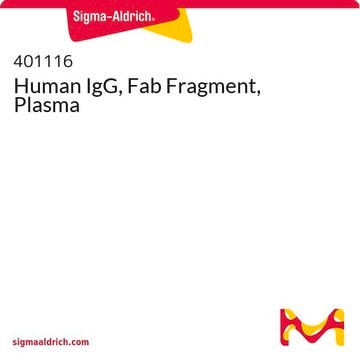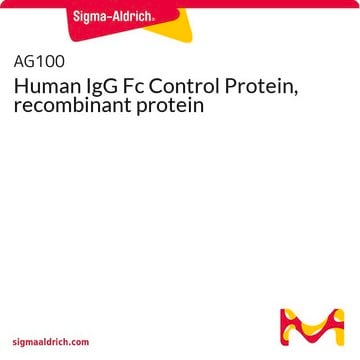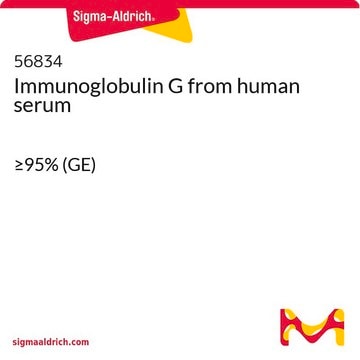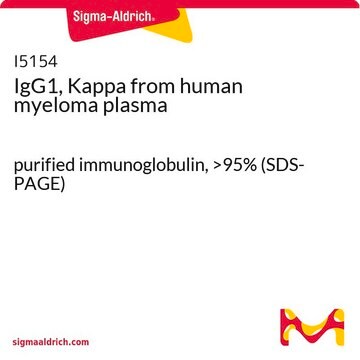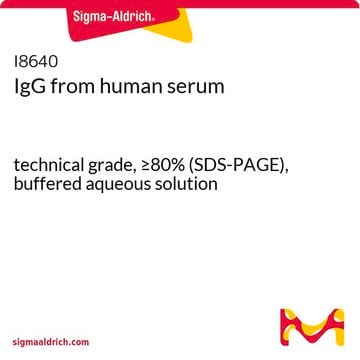AG714
Human IgG, Fc Fragment
Synonym(s):
IgG Fc Fragment
Sign Into View Organizational & Contract Pricing
All Photos(1)
About This Item
UNSPSC Code:
12352203
eCl@ss:
32160702
NACRES:
NA.41
Recommended Products
biological source
human
Quality Level
antibody form
purified immunoglobulin
manufacturer/tradename
Chemicon®
shipped in
wet ice
target post-translational modification
unmodified
General description
Product Source: Human serum. Tested by an FDA approved test method and found negative for HIV antibody, Hepatitis B Surface Antigen, antibody to Hepatitis C and syphilis.
Application
Research Category
Controls
Controls
Physical form
Format: Purified
Sterile liquid in 0.01 M Sodium Phosphate, 0.25 M NaCl, pH 7.6. No preservatives have been added.
Storage and Stability
Store under sterile conditions at +2-8°C for up to one year. Dilute only as needed for a single day′s use.
Analysis Note
Single precipitin line by immunoelectrophoresis at 20 mg/mL against Goat anti-Human whole serum. No cross-reactivity against Goat anti-Human IgG F(ab′)2 fragment, IgM, Fc(5μ) or IgA, alpha-chain specific. Purified by column chromatography.
Legal Information
CHEMICON is a registered trademark of Merck KGaA, Darmstadt, Germany
Disclaimer
RESEARCH USE ONLY. This product is regulated in France when intended to be used for scientific purposes, including for import and export activities (Article L 1211-1 paragraph 2 of the Public Health Code). The purchaser (i.e. enduser) is required to obtain an import authorization from the France Ministry of Research referred in the Article L1245-5-1 II. of Public Health Code. By ordering this product, you are confirming that you have obtained the proper import authorization.
Unless otherwise stated in our catalog or other company documentation accompanying the product(s), our products are intended for research use only and are not to be used for any other purpose, which includes but is not limited to, unauthorized commercial uses, in vitro diagnostic uses, ex vivo or in vivo therapeutic uses or any type of consumption or application to humans or animals.
Storage Class Code
12 - Non Combustible Liquids
WGK
WGK 2
Flash Point(F)
Not applicable
Flash Point(C)
Not applicable
Certificates of Analysis (COA)
Search for Certificates of Analysis (COA) by entering the products Lot/Batch Number. Lot and Batch Numbers can be found on a product’s label following the words ‘Lot’ or ‘Batch’.
Already Own This Product?
Find documentation for the products that you have recently purchased in the Document Library.
Customers Also Viewed
Frank Kung et al.
Investigative ophthalmology & visual science, 58(10), 4318–4331-4318–4331 (2017-08-15)
Rod photoreceptor terminals respond to retinal injury with retraction and sprouting. Since the guidance cue Semaphorin3A (Sema3A) is observed in the retina after injury, we asked whether Sema3A contributes to structural plasticity in rod photoreceptors. We used Western blots and
Iftiin Hassan Mohamed et al.
Pharmacological research, 64(5), 464-470 (2011-07-12)
The Eph tyrosine kinase receptors and their ephrin ligands play a central role in several human cancers and their deregulated expression or function promotes tumorigenesis, inducing aggressive tumor phenotypes. Green tea extracts (GTE) have been recently found to inhibit Eph-kinase
Delwin J Long et al.
Journal of molecular histology, 39(1), 1-4 (2007-07-27)
Immunohistochemical analysis of formalin-fixed paraffin-embedded tissues can be challenging due to potential modifications of protein structure by exposure to formalin. Heat-induced antigen retrieval techniques can reverse reactions between formalin and proteins that block antibody recognition. Interactions between antibodies and antigens
Enas Abu-Shah et al.
eLife, 8 (2019-09-26)
Research in the field of human immunology is restricted by the lack of a system that reconstitutes the in-situactivation dynamics of quiescent human antigen-specific T-cells interacting with dendritic cells. Here we report a tissue-like system that recapitulates the dynamics of
Anabel Gonzalez-Gil et al.
The Journal of allergy and clinical immunology, 147(4), 1442-1452 (2020-08-14)
The immunoinhibitory receptor Siglec-8 on the surface of human eosinophils and mast cells binds to sialic acid-containing ligands in the local milieu, resulting in eosinophil apoptosis, inhibition of mast cell degranulation, and suppression of inflammation. Siglec-8 ligands were found on
Our team of scientists has experience in all areas of research including Life Science, Material Science, Chemical Synthesis, Chromatography, Analytical and many others.
Contact Technical Service

